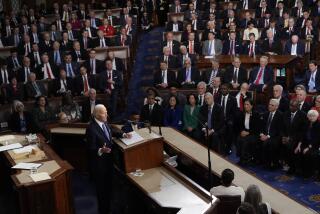Let’s have action on jobs
Two weeks and change. That’s all the time the Legislature has left to buy some public kudos — or to earn loud hoots.
On Sept. 9, the lawmakers are supposed to knock off for the year, pushing all unsettled business into January.
Gov. Jerry Brown could call them back into special session, but that usually doesn’t work out very well. Legislators tend to get aggravated when a governor interrupts their recess, and they basically ignore him.
The Legislature’s top leaders say publicly that economic development and job creation — more precisely, changing the widespread perception that California is anti-business — is their top remaining priority, now that the state budget has been relatively balanced.
California has the second highest unemployment rate (12%) of any state. Only Nevada is worse. And last year, California was at the bottom in business creation. In fact, it lost 4,600 businesses, according to a study by Economic Modeling Specialists Inc.
“I’m appalled that we’re at the end of the [legislative] session and we have done nothing to help business and create jobs,” says Jack Stewart, president of the California Manufacturers and Technology Assn.
Brown is expected to weigh in Thursday, holding a news conference to embrace a bill authored by Sen. Kevin De Leon (D-Los Angeles). As tweaked by the governor, the measure would provide a sales tax exemption for California firms buying manufacturing equipment. It also would expand a tax credit for job creation.
Employers with 50 or fewer workers would receive a $4,000 tax credit for each new hire. Currently, there’s a little-used $3,000 credit that affects only employers with fewer than 20 workers.
Brown offered basically the same thing in his budget proposal earlier this year, but it went nowhere. The state couldn’t afford it.
Under the Brown-De Leon proposal, the business tax breaks would be paid for by eliminating a new corporate loophole that essentially rewards companies for not building facilities and creating jobs in California. Plugging the loophole would raise up to $1.5 billion a year.
It’s considered unlikely to pass, however, because a two-thirds majority vote is required. Republicans have opposed closing the loophole because it would raise taxes on some businesses, even if most are based out of state. The GOP is deathly afraid of anything that smacks of a tax increase.
Democrats intend to put the bill up for a Senate vote anyway, then — in a twist — accuse Republicans running in competitive races next year of being anti-jobs creation.
Yes, in many cases, politics and personality may be trumping policy as the Legislature lurches toward recess. Shock, shock!
Assembly Speaker John A. Pérez (D-Los Angeles) is sponsoring a bill to create a single, potent state office to push for economic development. “A focal point,” he says, headed by “someone with the gravitas to bang heads … to move things forward, take the lead in permit streamlining and develop long term strategy.”
But Pérez is focused on — some say obsessed by — his drive to dissolve the scandal-plagued city of Vernon. His highly controversial bill is in the Senate, where some lawmakers privately complain that the speaker is threatening their legislation in the Assembly unless they back his attempt to quash Vernon.
It’s ransom politics. And it could be on full display in Thursday’s meetings of the Senate and Assembly appropriations committees. Both panels possess large stacks of bills that must be approved by tonight or they’ll be shelved for the year, absent last-minute skulduggery.
“There’ll be mutual hostage taking,” predicts one veteran legislative staffer, who didn’t want to be identified because such candor could anger his boss. “There’ll be long knives and nasty paybacks.”
Toss into this murky mix other hotly debated legislation, and you’ve ample ingredients for either deal-making or gridlock.
For example, there’s an effort by the potential developer of a downtown Los Angeles football stadium — Anschutz Entertainment Group — to short-cut environmental hurdles and avoid lengthy legal challenges.
This is irking many lawmakers because they figure that AEG, for tactical reasons, won’t get specific about what it actually wants until the last minute of the session. Then, it’s theorized, the group will try to ram the bill through both houses without much scrutiny.
There’s also a bill brewing to ban the death penalty if voters approve. California has spent an estimated $4 billion to administer capital punishment over the last 33 years and executed only 13 people — averaging $308 million per execution.
That bill has a good chance of passing. It would need to go on the ballot next year. And it would attract to the polls many liberals and minorities who could help Democrats on other causes.
So the Legislature’s so-called top priority — economic development and job creation — could well get lost in the fog.
Two very big issues are business regulatory relief and lengthy lawsuits filed under the California Environmental Quality Act. Both cry out for reform.
The environmental act is often used by business rivals to block competition and by organized labor to force unionization. But Democrats — pressured by environmental groups and labor unions — have resisted doing anything about it.
Meanwhile, California remains tarnished with its anti-business reputation.
There is legislation in the works that tinkers around the edges of regulatory and lawsuit reforms. Hey, pass it — along with a jobs tax credit and manufacturers’ sales-tax exemption. Do something.
Otherwise, somebody should prepare a ballot initiative demoting the Legislature to part-time — and make it one house to sheathe some of the long knives.
More to Read
Start your day right
Sign up for Essential California for news, features and recommendations from the L.A. Times and beyond in your inbox six days a week.
You may occasionally receive promotional content from the Los Angeles Times.







